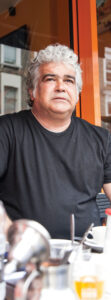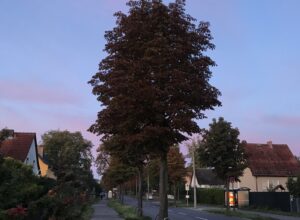An Interview with award-winning Syrian writer Khaled Khalifa
Interview by Alaa Elbannan with photography by Nikolay Merchev
Profound, original, and bittersweet, Khaled Khalifa’s latest creation No Knives in This City’s Kitchens defines home within the reflection of a broken family haunted by the beautiful city of Aleppo, in search of its lost innocence. The Syrian’s latest novel has garnered him the prestigious 2013 Naguib Mahfouz Medal for Literature presented by The American University in Cairo Press (AUC Press).
His novel magically portrays a beloved Syria through the story of a family that lived the marred dream of democracy during the 1960s, under the reign of the Ba’ath Party; the party that divided the country’s front lines and ruined its youth. The book starts and ends with death—as the author describes it—death that does not mean absence, but the perfection of the memory. With a language so rich and a tone so soothing, Khalifa’s novel encompasses subtle meanings of humanity, fraternity, and dignity. He puts us face to face with the question: What should one live for, and what should one die for?
Throughout the novel, symbolism is used to convey the message of unfulfilled dreams and broken promises. The bright lettuce fields that shrink into demolition; Sawsan who grows old and still wears short skirts, which show off her sagging skin and lost dreams; and the dinner table of special occasions, where the family holds on so hard to the illusion of being a family hiding within their oblivious existence.
With a long line of book titles on his shelf, Khalifa’s other work includes The Guard of Deception (1993), also his favorite, The Gypsy Notebooks (2000), and In Praise of Hatred (2006). In Praise of Hatred was shortlisted for the 2008 International Prize of Fiction.
This year, No Knives in This City’s Kitchens, currently being translated into English, was shortlisted for the 2014 Arabic Booker Prize. Khalifa has recently started working on a new novella, partially shedding light on Syria’s ongoing civil war.
Rowayat’s Junior Editor Alaa Elbannan interviewed the award-winning author, asking him about his latest creations, and the trials and tribulations of being an Arab writer following the eruption of the Arab Spring.
Sneak Peek of No Knives in This City’s Kitchens
Why is “hopelessness” the shared sentiment between all the characters? Is it because of the authority they try to practice, the mother over her family, the authority of the party, the authority of their dreams?
I consider this to be one of the saddest novels I have ever written. Writing it was sad. Its initial title was A Parallel Life. I saw how dreams have been altered; how the dream of a civilized country has turned from building a democracy into a mere desire to survive the day. It was so cruel to witness this daily transformation. I lived with ambitious and wonderful people, yet with each passing day, their dreams were turned into nightmares, into evilness, into nothing. You start seeing how the reign of the “One Party” can destroy people’s humanity.
Nonetheless, we always need to ask ourselves, are our governments the only entities to blame? Who gave the chance for such corruption to survive in the first place?
The narrator of your novel is a member of the family, yet his or her identity is unknown. Consequently placed in a Godly position, as someone who knows everyone else’s secrets. Many critics think that you should have used a clearer narrative style. What would your answer be?
There is nothing such as “should have” in writing as a creative art form. There shouldn’t be any rules limiting creativity. The only thing a writer should do is to tell a good story. The good thing about this kind of narrative is that the reader realizes at the end that he is the narrator. Simply, every new writing technique is a suggestion, it’s a new way to explore a narrative, and it all depends on the nature of the story, the message, and the storyline.
Can you tell us more about what it means to create a rhythm in a novel?
You can only control your rhythm through freedom. In other words, choose a style that makes you feel free and comfortable as a writer. One that makes you feel at ease, and only then do you start writing and keep on writing freely, and with no restrictions. I wish I could explain more—it’s such a natural spontaneous process; one that is very hard to put into words.
Going back to one of your interviews, you talked about every writer’s dead moment. What do you mean by it? What is your “dead moment”?
The dead moment is when the writer succeeds to isolate himself from his characters and become completely unbiased. It’s to not react with them or interfere in their lives, morally or ideologically. The relationship between a writer and his characters should be solely limited to him telling their story. The writer shouldn’t try to revive a certain character when it wants to die, or let one of the characters dominate the story by taking a space bigger than she or he should take.
The writer’s role is to play with the strings coldly and calmly. It could be really tempting to get emotional and subjective, but it shouldn’t happen. In Arabic writing, especially, as a result of the conservative culture and traditions, morals and ethics tend to interfere a lot, and you find certain concepts are either highlighted or doomed according to the writer’s preferences. You have to be objective, so look at things from all angles. You have to be tolerant; you are the creator and not the judge.
How do you create the characters of your stories?
There is an invisible reaction between the writer and his or her characters. Sometimes I see writers investigating, hunting for material by getting closer or befriending certain people. I don’t like this approach. On the other hand, some people would directly tell me “I will tell you my story to write about.” However, I can never promise to write about someone in specific. I always find, within me, something much more important to say, I have my own story. Also, one of the most important factors about writing is imagination, so even if someone inspires you, imagination should play a role. In the end, everyone has his own style and methods. People are different.
Were you or any of your close relations ever the protagonist of any of your stories?
I never intend to do that, yet sometimes after I finish writing, I realize that my character resembles someone I know, or at least shares some qualities with them. And some characters surprise me, wherein I find them willing and determined to live on, hence forcing me to prolong their role in the story, allowing their taking up of more space than I had initially expected. For example, Jan, the French language teacher in the novel, was meant to be a goal for an impulsive student, Sawsan, at a certain point in her life. And then I found her wanting to be more than just that, I didn’t stop her from growing, yet I didn’t allow her to completely dominate. Again, that’s a dead moment. I found myself included in this story unwillingly; I found all my characters choosing to destroy their own dreams. Even their beloved city, Aleppo, destroyed itself.
How would you define “salvation”?
Salvation is to defend your right to grow and to develop your abilities to differ, but not to judge. Claiming to be religious, does not give you the right to judge and expect others to embrace your beliefs. I am not a sheep following its herd. We also need to learn how to accept one another and not to discriminate against anyone who is different.
In a former interview, you had mentioned that love prevents hatred from growing even though you know it’s a lie. Please comment.
Yes, love doesn’t stop hatred from growing. When a love relationship ends with pain, it leaves a thread of hatred lingering behind. That’s why we need to deal with hatred from a new perspective, not that it is the other face that contradicts love, but as a part of love itself. Human nature still surprises me, but in a good way.
Writing makes one more compassionate and sympathetic. One may think that a writer designs and creates characters, but it’s the characters that actually build and make a writer. It might not be very clear to every writer, but fictional characters do have their own emotions, feelings and culture, just like actual people.

Getting to Know the Author
What is it like being a full-time writer?
Writing is my job, and it is very difficult to be a writer. Writing is a profession that evokes difficult-to-answer, self-searching questions. This is a job that requires nothing less than complete dedication; talent alone is not enough. Writing is hard work.
When it comes to writing, there is no inspiration; there is daily work and daily commitment, and this is what instills inspiration. I had to face a lot before deciding to become a writer, especially going against my family’s wishes and opting to become a writer and not a lawyer.
I am happiest when I am writing, and I envy myself for being a writer. It’s hard to explain why I find it so enjoyable, it’s simply my passion. I always compare it to playing and having fun. Writing transforms me into a child, with an urge to learn new things. Becoming a successful writer protects you from the world’s ignorance, and serves as a great means to support oneself financially.
If it were up to me, I wouldn’t have cared to publish any book. I would just write and that’s it.
What instigates fear and prevents you from writing?
When I start the process of publishing a new book, because that is when the writing is over, in other words, this is when the fun is over. Finishing a book is always an achievement, but not an enjoyable one. I just enjoy the writing, so when that part is done, there is nothing else for me to enjoy.
Finishing a book makes me feel like I have lost my ability to write; I feel exhausted, depressed, and unconfident in my writing, just like any amateur writer. I sometimes go as far as thinking of altering my career path and starting a new life, yet these feelings disappear with the birth of a new idea for a new book. It is only then that I start to enjoy the process again.
“You have to be tolerant; you
are the creator, and not
the judge.”

What inspires you?
My mother and aunt, whom I consider my best friends, raised me. These two women have deeply influenced my life, and I believe that women truly are a true source of inspiration and the reason behind anything beautiful in life.
When you are not busy writing, what else do you do?
I love cooking and I would love to write about it someday.
Tell us one thing that not many people know about you?
In another life, I would like to get reincarnated into an olive tree, the symbol of my beloved Aleppo.
The Future of Writing in The Arab World
The eruption of the Arab Spring has paved the way for a new literary movement to rise throughout the region, what can you tell us about that?
The eruption of the Arab Spring has paved the way for many writers and publishers to rise. I think it is great that more people are freely expressing themselves. And as for the quality of the work, it is up to the reader to decide. After all, only time will tell; good writing lasts and bad writing fades away.
What advice would you give to emerging writers?
Writing is real happiness, so never give up on it. Defend it and never stop writing.
Any last words?
The darkest clouds might overshadow Arab cities, but they have not yet turned into ashes. Cities do die, just like people, when they are unable to give birth to art, however, their souls can be revived.
Khalifa’s Message to the World at the Naguib Mahfouz Awards
Held on December 11, 2013, the Naguib Mahfouz Literary awards ceremony celebrated Khalifa’s work and contribution to the Arab literary world. The event took place at AUC’s Oriental Hall at its Tahrir Square Campus. This annual event was created to honor the memory of the Nobel Prize Winner, the late Naguib Mahfouz.
Despite being unable to attend this literary extravaganza, Khalifa wrote a very special message to all attendees; a powerful message of honesty and compassion, later translated by AUC Press:
We work in fragility because we produce beauty; we contribute to making human life less solitary and harsh. We do not grant the oppressed victory, but we help the oppressed regain their strength and struggle for their cause. We cannot convince an abandoned woman that solitude is not so unbearable, but we can make her solitude less unendurable. We expose oppressors, opportunists, and murderers, but we are not a court that passes sentences. That is how I see the novel that changed my life, that made me less harsh and more precise in passing sentences that are valuable, unequivocal, and unquestionable because in the novel everything is subject to question, change, and alternative possibilities because it is simply a human record that still reiterates its questions about joy, love, and hatred, and still seeks its central question and here I mean the question of death.
“I am happiest when I am writing,
and I envy myself for being a writer.”








